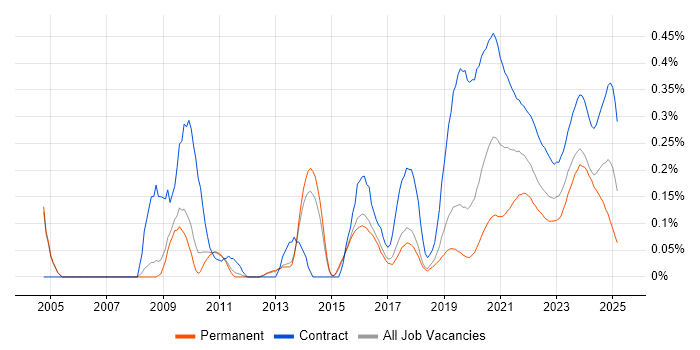Logical Data Model
UK > Work from Home
The table below provides summary statistics and salary benchmarking for remote or hybrid work requiring Logical Data Model skills. It covers permanent job vacancies from the 6 months leading up to 27 February 2026, with comparisons to the same periods in the previous two years.
| 6 months to 27 Feb 2026 |
Same period 2025 | Same period 2024 | |
|---|---|---|---|
| Rank | 342 | 398 | 476 |
| Rank change year-on-year | +56 | +78 | +178 |
| Permanent jobs citing Logical Data Model | 46 | 25 | 52 |
| As % of all permanent jobs with remote/hybrid work options | 0.28% | 0.17% | 0.19% |
| As % of the Processes & Methodologies category | 0.33% | 0.18% | 0.20% |
| Number of salaries quoted | 31 | 15 | 40 |
| 10th Percentile | £57,500 | - | £52,250 |
| 25th Percentile | £61,250 | £56,809 | £53,750 |
| Median annual salary (50th Percentile) | £65,000 | £61,206 | £68,250 |
| Median % change year-on-year | +6.20% | -10.32% | -0.66% |
| 75th Percentile | £81,875 | £89,885 | £93,125 |
| 90th Percentile | £115,000 | £111,250 | £111,250 |
| UK median annual salary | £75,000 | £67,500 | £80,000 |
| % change year-on-year | +11.11% | -15.63% | +14.29% |
All Process & Methodology Skills
Work from Home
Logical Data Model falls under the Processes and Methodologies category. For comparison with the information above, the following table provides summary statistics for all permanent job vacancies with remote or hybrid options requiring process or methodology skills.
| Permanent vacancies with a requirement for process or methodology skills | 14,107 | 14,261 | 25,694 |
| As % of all permanent jobs with a WFH option | 85.79% | 95.09% | 92.67% |
| Number of salaries quoted | 9,144 | 8,729 | 21,335 |
| 10th Percentile | £30,991 | £36,000 | £34,750 |
| 25th Percentile | £42,500 | £47,500 | £42,750 |
| Median annual salary (50th Percentile) | £60,000 | £62,500 | £57,500 |
| Median % change year-on-year | -4.00% | +8.70% | -8.00% |
| 75th Percentile | £80,000 | £82,500 | £76,250 |
| 90th Percentile | £100,000 | £102,550 | £95,000 |
| UK median annual salary | £55,000 | £60,001 | £55,000 |
| % change year-on-year | -8.33% | +9.09% | -12.00% |
Logical Data Model
Job Vacancy Trend for Remote/Hybrid Jobs
Historical trend showing the proportion of permanent IT job postings citing Logical Data Model and offering remote or hybrid work options relative to all permanent IT jobs advertised.

Logical Data Model
Salary Trend for Remote/Hybrid Jobs
Salary distribution trend for jobs with remote/hybrid work options citing Logical Data Model.

Logical Data Model
Salary Histogram for Remote/Hybrid Jobs
Salary distribution for jobs with remote/hybrid work options citing Logical Data Model over the 6 months to 27 February 2026.
Logical Data Model
Co-Occurring Skills & Capabilities in Remote/Hybrid Jobs by Category
The following tables expand on the one above by listing co-occurrences grouped by category. They cover the same employment type, locality and period, with up to 20 co-occurrences shown in each category:
